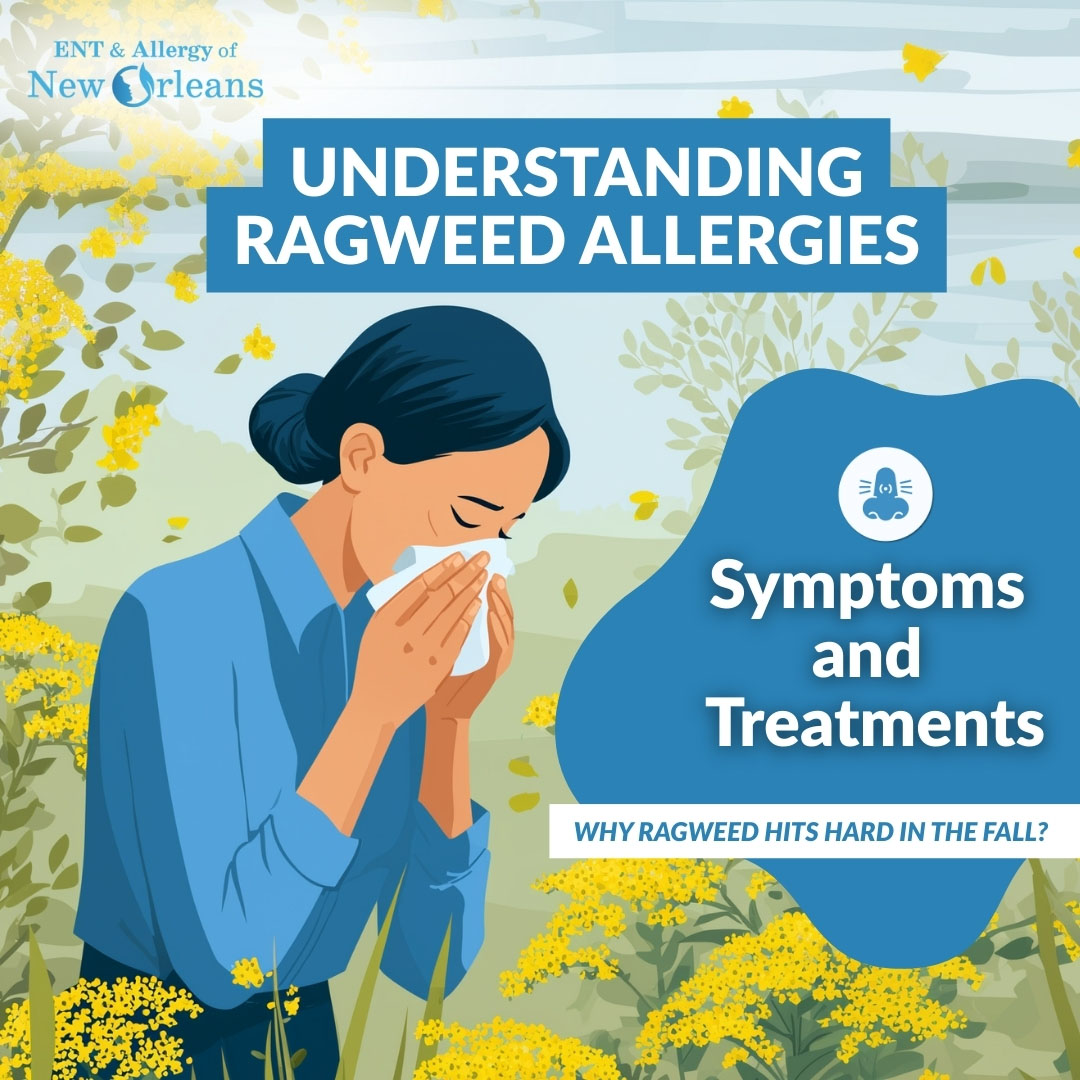Allergy News & Information Blog

Understanding Ragweed Allergies: Symptoms and Treatments
Every fall, ragweed pollen takes over the air in Louisiana, triggering sneezing, itchy eyes, and congestion for thousands of residents. In New Orleans, where warm, humid weather can extend the pollen season, ragweed allergies often hit harder and last longer. At ENT & Allergy of New Orleans, we help patients understand their triggers and find ways to help manage symptoms and reduce their impact on daily life.
Why Ragweed Hits Hard in the Fall
Ragweed typically starts releasing pollen in late August and can continue until the first frost. Unfortunately for New Orleans residents, the mild fall temperatures mean this season can stretch well into November. Even if you don’t see ragweed plants nearby, their lightweight pollen can travel hundreds of miles through the air.
Because of this, many people may experience prolonged symptoms unless they take proactive steps to reduce exposure, though complete avoidance is rarely possible.
Common Symptoms of Ragweed Allergies
Ragweed allergies often mimic the symptoms of a cold, but they last much longer. If you’re dealing with any of the following for more than a week or two, ragweed may be the cause:
- Sneezing and runny nose that doesn’t clear up quickly.
- Itchy, watery eyes that get worse outdoors.
- Nasal congestion makes it harder to breathe through your nose.
- Post-nasal drip leading to throat irritation or cough.
These symptoms can also worsen asthma or other respiratory issues, making early treatment especially important.
Reducing Your Exposure to Ragweed Pollen
While you can’t completely avoid ragweed pollen, daily habit changes may help reduce your exposure and ease some symptoms:
- Stay indoors on high pollen days – Check the daily pollen forecast and limit outdoor activities when counts are high.
- Keep windows closed – Use air conditioning instead of fresh air to prevent pollen from blowing inside.
- Change clothes after going outside – Pollen clings to fabric, so a quick change and shower can help.
These habits work best when started early in the season, before symptoms flare up.
Treatment Options That Can Help
If lifestyle changes aren’t enough, several treatments may help ease ragweed allergy symptoms and support better comfort for many patients.
- Over-the-counter antihistamines – These can reduce sneezing, itching, and runny nose.
- Nasal steroid sprays – Help decrease inflammation in nasal passages for easier breathing.
- Allergy shots or drops (immunotherapy) – Long-term treatment that is designed to help your immune system become less reactive to ragweed pollen over time.
Your ENT can recommend the right combination of treatments based on your symptoms and medical history.
When to See an ENT in New Orleans
If ragweed season leaves you feeling miserable year after year, or if over-the-counter medications aren’t helping, it’s time to see an ENT. They can confirm whether ragweed is your main trigger, check for other allergies, and recommend targeted treatments aimed at managing your symptoms more effectively.
Take Control of Ragweed Season
Ragweed may be a part of fall in New Orleans, but your symptoms don’t have to be. With the right combination of prevention strategies and treatments, you may be able to reduce discomfort and enjoy the season with greater ease.
At ENT & Allergy of New Orleans, we’re committed to helping our community find relief from seasonal allergies like ragweed. If you’re ready to take the next step toward feeling better this fall, schedule a consultation with our team today.
Disclaimer:
The information provided in this article is for informational and educational purposes only and does not constitute medical advice. It is not intended to diagnose, treat, cure, or prevent any disease or medical condition. Always seek the guidance of your physician or other qualified healthcare provider with any questions you may have regarding a medical condition or treatment.
Results may vary: Treatment outcomes and health experiences may differ based on individual medical history, condition severity, and response to care.
Emergency Notice: If you are experiencing a medical emergency, call 911 or seek immediate medical attention.


